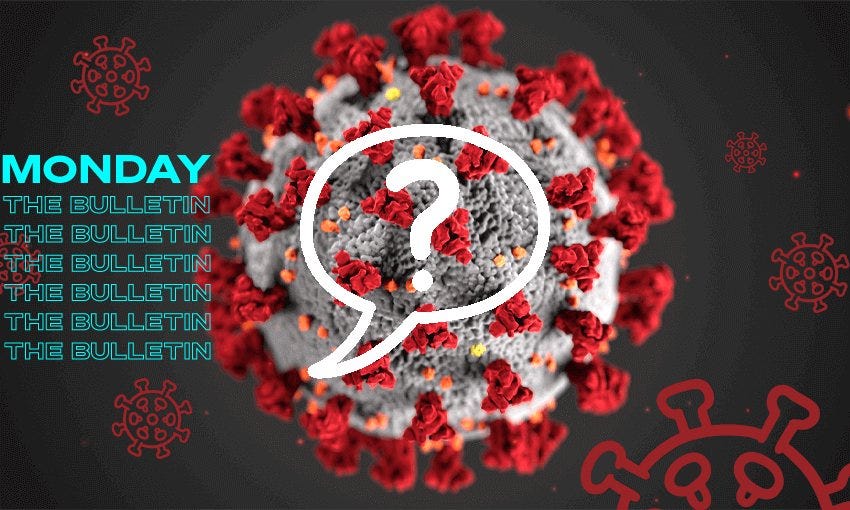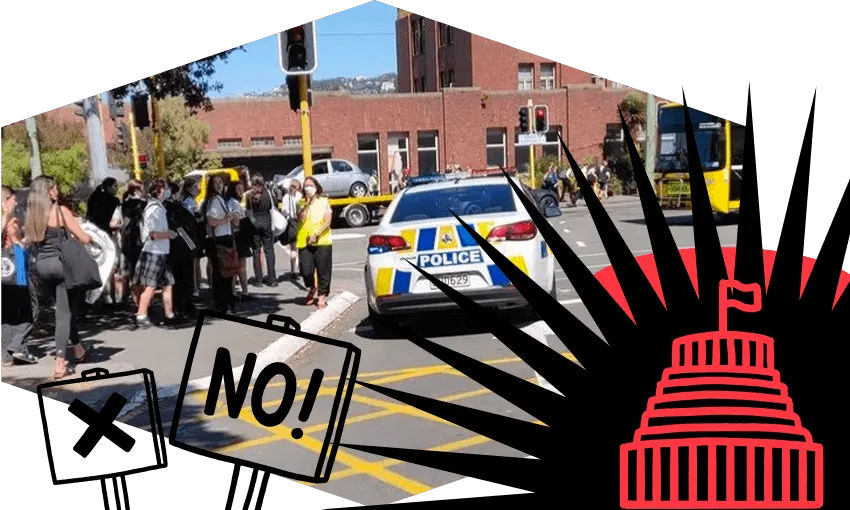Mōrena and welcome to The Bulletin for Monday, February 28, by Justin Giovannetti. Presented in partnership with Z Energy.
In today’s edition: Fierce fighting in Ukraine’s capital; Wellington protest cases in hospital with Covid; bilingual signs proposed for Bluff; but first, how omicron has changed everything.
A lot of the Covid response is now up to you. (Image: Tina Tiller)
A new world. New Zealand’s first case of Covid-19 was detected exactly two years ago. The country’s approach to the pandemic has shifted radically since then, but few changes have been as sudden and significant as those of the past week. More significant changes could be just around the corner. After two years of scanning, contact tracing and isolating, New Zealanders now face a do-it-yourself approach to omicron. Late last week, the director-general of health and Covid-19 minister unveiled the new approach. Here are 10 things you should know.
Only household contacts need to isolate. One of the biggest changes of phase three of the omicron response has been doing away with close and casual contacts. There are now only two groups that matter: confirmed Covid cases and the households who need to isolate alongside them. “With omicron as with prior variants of the virus, household contacts are the most likely by far to become infected as secondary cases. That's why in this phase we are focusing just on household contacts isolating,” director-general of health Ashley Bloomfield said last week.
There are now legal requirements, and there’s what you should do. Friends, coworkers and others who spend time with a case can still isolate as well, but they won’t be legally required to. As Covid-19 minister Chris Hipkins said, New Zealanders now need to make up their own minds. “We are asking New Zealanders to accept a much greater degree of personal responsibility for what they do,” he said. Without a legal requirement to isolate, it’ll be a tougher discussion to have with employers.
Students should keep going to class, despite cases. Unless a student is exposed to someone in their household with Covid-19, they are expected to keep going to class. Even if the person sitting beside them tests positive. After some reports of schools coding absences as unjustified for students missing class because of fears they are a contact, Hipkins, as education minister, also sent a bit of a warning to schools: “If you are simply a broader contact of someone who might have Covid-19, you are not required to isolate. But parents, I am sure, will make judgements about that. I know schools will make pragmatic decisions about, for example, how they code student absences.”
Many people will only see rapid tests from now on. After two years of what a colleague described as the “old nose probe” being central to the country’s testing system, PCR tests are now being reserved for certain people. Bloomfield explains: “PCR testing will be used for people who are unwell or more susceptible, for example, those in hospital, people who are immunocompromised, pregnant people, and others for whom it is very important in terms of clinical management to have a specific diagnosis.” RATs do still require self-administered nose probing.
RATs won’t always be free after all. At the midpoint of last week the country was down to one million rapid tests, but after some large deliveries, nearly 20 million should be on hand this coming week. That’s good because RATs will not only be the main test from now, they are also available for purchase at pharmacies and supermarkets. The Spinoff found a box of five for sale at an Auckland Countdown for $46.95. In January, the prime minister said RATs would always be “free for people who need them”. Without any fanfare, that description now only applies to people with symptoms who can queue at testing centres. For those who want to undertake surveillance tests or can’t wait hours for a test, be prepared to pay. There are no plans for free surveillance tests, like in Europe.
How much should a RAT cost? One of the reasons the prime minister promised the tests would remain free was because of stories of price gouging in Australia. With the decision now to leave it up to the free market, Hipkins said no price controls will be put in place, but he expects retailers will continue to be “very responsible”. According to Bloomfield, you should pay between $8 and $10 per test.
Contact tracing is out. There will still be some tracing of cases who go to high-risk locations like hospitals and aged care facilities, but most cases won’t get a call from a contact tracer anymore. If you’d like to warn your contacts that you got infected, that’s your own choice.
Keep scanning, or don’t. “It is still helpful to scan,” said Bloomfield, but notifying your non-household contacts is now a personal responsibility. It wasn’t a full defence of scanning. University of Auckland research fellow Andrew Chen told Stuff that it’s important to stay in the habit of scanning, so it might be worth keeping it up. Either way, vaccine passes and ubiquitous QR codes could be an endangered species now.
The government doesn’t want to talk about daily cases anymore. “Hospitalisations now become a major focus and daily case numbers will become a less important metric from this point onwards,” said Hipkins.
Does MIQ still make sense? For most of the last two years, managed isolation and strict border controls has been described by the government as the country’s main line of defence. With nearly 15,000 daily cases in the community and a dozen or so at the border, it’s not so clear what MIQ is defending. Facing questions, Hipkins seemed reluctant to throw his full support behind MIQ, which is noteworthy:
"We are days away from the border reopening (editor’s note: it opened today). For Australia, and then shortly thereafter followed by the rest of the world. We are reviewing the self- isolation requirements for people coming into the country. I have no announcement on that at the moment, we are still being advised about whether people should still need to self-isolate on arrival in New Zealand. We expect to get that advice in the next week or two,” he said. The entire self-isolation requirement could be gone next month, with MIQ not far behind it.
A quick word. With omicron cases increasing and tensions running high, there has never been a greater need for trustworthy and freely accessible journalism. The generous support of our members powers all of The Spinoff's Covid-19 coverage, from live updates to the award-winning mahi of Toby Morris and Siouxsie Wiles. Tautoko mai, join The Spinoff Members today.
Ukraine’s capital is under siege as Russian forces pummel the city of three million with air strikes. The Ukrainian military has mounted a fierce resistance as it has faced the most powerful military in Europe. Russian tanks have been aimed straight at the country’s largest cities, with reports of heavy fighting in the outskirts of Kyiv. Reuters provides an overall view of the situation, but the Battle of Kyiv is underway. “Make Molotov cocktails, neutralise the occupier!” the country’s defence minister said in a statement to civilians.
Economic sanctions are worsening. As The Guardian reports, the US, UK, Europe and Canada are now moving to cut Russian banks off from the global financial system known as Swift. Russia has put its nuclear forces on high alert, according to the AP. In New Zealand, Fonterra told Farmer’s Weekly that Russia is one of the country’s largest market for butter. The company said it would respect UN sanctions, but won’t stop shipping to Russia until then. Russia has a veto on the security council, so no sanctions are likely.
How to deal with disinformation. Over the weekend, Russian media reported that Ukraine’s president had fled the capital. So president Volodymyr Zelenskyy did what modern leaders do, he went outside the presidential palace, turned on Instagram, and spoke to the country alongside the prime minister and senior officials. Stuff has published a profile on Zelenskyy’s unlikely rise from comedian to Ukrainian hero.
Three cases connected to parliament protest now in hospital with Covid-19. As police warn that the situation at parliament is no longer safe for children and families due to a deteriorating sanitary situation, health officials told One News that cases connected to the protest are now in hospital. In Auckland, RNZ reports that the domain is now closed to vehicles after an anti-mandate protest set up tents over the weekend.
The Spinoff’s Stewart Sowman-Lund wrote about his week at Wellington’s “freedom village” and it’s a worthwhile read for anyone who wants to better understand the situation.
High Court ruling ends vaccine mandate for police. The Police Association says it wants unvaccinated police officers back at work immediately, RNZ reports. Other vaccine mandates might now be under legal threat after the court ruling. Andrew Geddis wrote in The Guardian that ending vaccine mandates too quickly would be a mistake and would likely cause unnecessary deaths during the omicron wave.
The border reopened this morning for New Zealanders in Australia. A flood of arrivals isn’t expected with the end of the MIQ requirement for passport holders and residents in Australia, with the NZ Herald reporting that 6,700 arrivals are expected this week. Returnees still need to self-isolate for seven days.
Bilingual signage could be coming to Bluff. The Otago Daily Times reports on a pair who want to help normalise te reo and restore indigenous place names to Bluff with new signage. About 80% of children living in Bluff identify themselves as Māori. The plan now is heading out to wider public consultation before it’s presented to Invercargill council for approval.
Got some feedback about The Bulletin, or anything in the news?
Get in touch with me at thebulletin@thespinoff.co.nz
Right now on The Spinoff: Ella Duggan & Raya Hotter, two Wellington school students, explain what life is like near the parliament protest. Siouxsie Wiles updates her Flatten the Curve chart for 2022. Chris Schulz asks whether robots are the future of restaurant work. Charlotte Muru-Lanning writes about Auckland’s perfect bakery pairing. Sam Brooks looks at whether Hanya Yanagihara is writing fanfic.
Blues fall to Hurricanes in late stumble. The Blues dominated the match at Forsyth Barr stadium, RNZ reports, only to crash at the end to a 33-32 loss. Much of the attention was focused on the long-awaited debut of Roger Tuivasa-Sheck, who seemed comfortable on the field and one of the best players in the park.
The rugby world is mourning the death of former All Black Joeli Vidiri. According to the Herald of Sunday, he died of Covid-19 while travelling in the US on his wedding trip.






